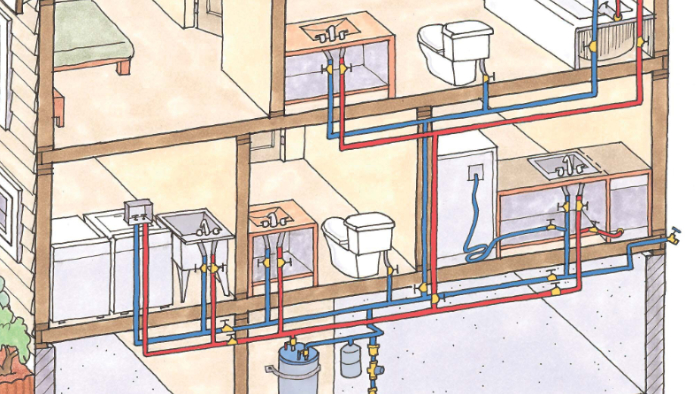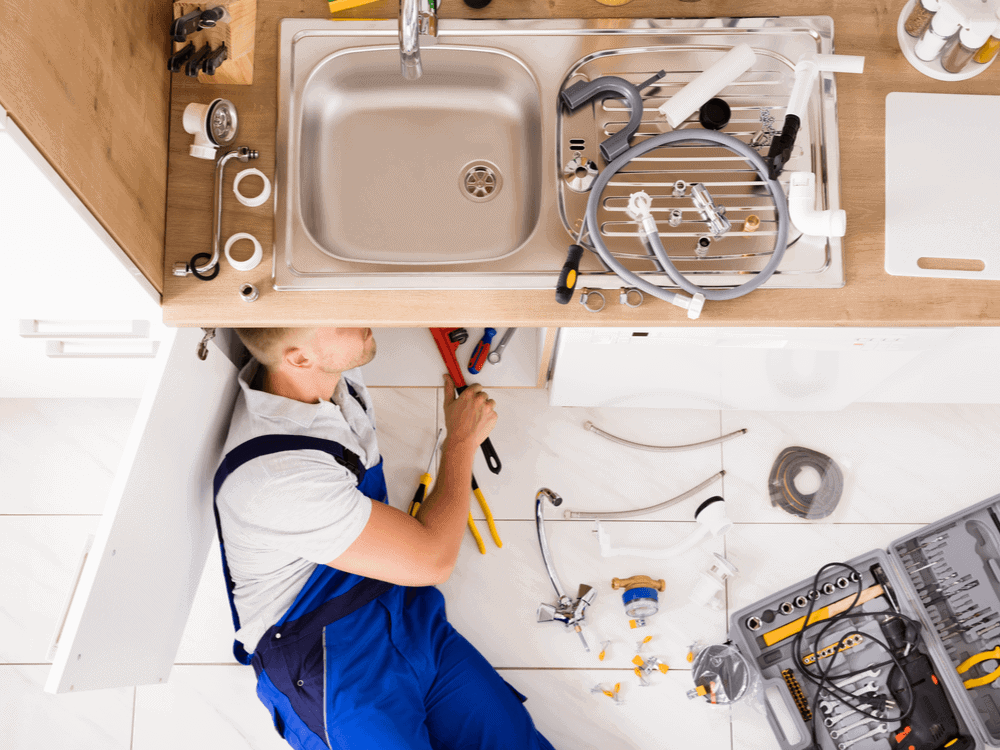A Detailed Look at Your House's Plumbing System Anatomy
A Detailed Look at Your House's Plumbing System Anatomy
Blog Article
This post directly below in relation to The Inner Workings of Your Home's Plumbing is seriously captivating. Have a go and draw your own personal conclusions.

Comprehending just how your home's plumbing system works is crucial for every house owner. From supplying clean water for alcohol consumption, cooking, and bathing to securely getting rid of wastewater, a well-maintained plumbing system is critical for your household's wellness and convenience. In this extensive overview, we'll explore the elaborate network that comprises your home's plumbing and offer ideas on upkeep, upgrades, and taking care of usual issues.
Introduction
Your home's plumbing system is greater than simply a network of pipelines; it's an intricate system that ensures you have access to clean water and effective wastewater elimination. Knowing its components and how they collaborate can assist you avoid expensive repair services and guarantee whatever runs smoothly.
Fundamental Parts of a Plumbing System
Pipes and Tubing
At the heart of your plumbing system are the pipelines and tubes that bring water throughout your home. These can be made from different materials such as copper, PVC, or PEX, each with its advantages in terms of longevity and cost-effectiveness.
Components: Sinks, Toilets, Showers, and so on.
Fixtures like sinks, toilets, showers, and bathtubs are where water is used in your home. Understanding just how these components attach to the pipes system helps in identifying issues and preparing upgrades.
Valves and Shut-off Points
Shutoffs regulate the circulation of water in your plumbing system. Shut-off valves are critical during emergencies or when you need to make fixings, permitting you to separate parts of the system without interrupting water flow to the entire house.
Water Supply System
Main Water Line
The main water line connects your home to the municipal water supply or a private well. It's where water enters your home and is dispersed to different components.
Water Meter and Stress Regulator
The water meter steps your water usage, while a stress regulator makes certain that water moves at a risk-free stress throughout your home's plumbing system, preventing damages to pipes and fixtures.
Cold Water vs. Warm water Lines
Comprehending the difference between cold water lines, which supply water straight from the primary, and hot water lines, which carry warmed water from the water heater, assists in fixing and preparing for upgrades.
Drain System
Drain Water Lines and Traps
Drain pipes bring wastewater away from sinks, showers, and commodes to the drain or sewage-disposal tank. Catches stop drain gases from entering your home and additionally trap particles that might create obstructions.
Ventilation Pipelines
Air flow pipes permit air into the drainage system, protecting against suction that might reduce drain and create traps to vacant. Proper air flow is vital for keeping the stability of your pipes system.
Importance of Appropriate Drainage
Making certain correct drain protects against back-ups and water damages. Routinely cleansing drains and preserving traps can protect against pricey repair work and extend the life of your plumbing system.
Water Furnace
Kinds Of Water Heaters
Water heaters can be tankless or standard tank-style. Tankless heating units heat water as needed, while containers keep warmed water for instant usage.
Upgrading Your Plumbing System
Factors for Updating
Upgrading to water-efficient fixtures or changing old pipelines can enhance water quality, reduce water costs, and boost the worth of your home.
Modern Plumbing Technologies and Their Advantages
Explore innovations like clever leakage detectors, water-saving toilets, and energy-efficient water heaters that can conserve cash and lower environmental impact.
Expense Factors To Consider and ROI
Compute the upfront expenses versus lasting financial savings when thinking about pipes upgrades. Several upgrades pay for themselves through minimized energy bills and fewer repair work.
Exactly How Water Heaters Link to the Pipes System
Recognizing just how hot water heater link to both the cold water supply and warm water circulation lines aids in diagnosing problems like not enough hot water or leaks.
Upkeep Tips for Water Heaters
Frequently purging your water heater to eliminate debris, checking the temperature level setups, and evaluating for leakages can expand its lifespan and enhance power performance.
Usual Pipes Concerns
Leakages and Their Causes
Leaks can occur due to maturing pipes, loosened installations, or high water stress. Attending to leaks quickly avoids water damage and mold development.
Obstructions and Clogs
Blockages in drains and toilets are often caused by flushing non-flushable things or an accumulation of grease and hair. Using drainpipe displays and being mindful of what decreases your drains pipes can stop blockages.
Signs of Pipes Issues to Look For
Low tide pressure, sluggish drains pipes, foul odors, or unusually high water bills are indicators of prospective plumbing issues that ought to be addressed without delay.
Pipes Maintenance Tips
Regular Examinations and Checks
Schedule annual pipes evaluations to capture problems early. Look for indicators of leaks, corrosion, or mineral build-up in faucets and showerheads.
DIY Upkeep Tasks
Basic tasks like cleansing faucet aerators, looking for toilet leakages using color tablets, or shielding exposed pipelines in chilly climates can stop major plumbing concerns.
When to Call an Expert Plumber
Know when a pipes issue calls for professional experience. Attempting intricate repair work without correct understanding can bring about more damages and greater repair work prices.
Tips for Reducing Water Usage
Simple routines like dealing with leaks immediately, taking much shorter showers, and running full tons of washing and dishes can save water and reduced your energy bills.
Eco-Friendly Plumbing Options
Think about lasting pipes materials like bamboo for flooring, which is durable and green, or recycled glass for countertops.
Emergency Preparedness
Actions to Take Throughout a Pipes Emergency
Know where your shut-off valves are located and just how to switch off the water supply in case of a burst pipe or major leak.
Relevance of Having Emergency Contacts Useful
Keep get in touch with info for local plumbings or emergency services easily offered for fast feedback throughout a pipes crisis.
Environmental Effect and Conservation
Water-Saving Fixtures and Home Appliances
Setting up low-flow taps, showerheads, and bathrooms can considerably minimize water usage without giving up performance.
DIY Emergency Fixes (When Suitable).
Momentary solutions like making use of air duct tape to spot a dripping pipeline or putting a container under a leaking faucet can minimize damage till a specialist plumber shows up.
Final thought.
Comprehending the anatomy of your home's plumbing system encourages you to keep it successfully, saving money and time on repair services. By complying with routine maintenance regimens and remaining notified about modern-day pipes technologies, you can ensure your pipes system operates efficiently for several years ahead.
Understanding Your Home Plumbing System: A Comprehensive Guide
Plumbing System: The Lifeline of Your Home
At its core, the plumbing system is designed to perform two primary functions: bring fresh water into your home and remove wastewater. The system is a network of pipes, fixtures, and other components that transport water and sewage. Residential plumbing systems include potable water supply lines, drain-waste-vent (DWV) systems, and various plumbing fixtures that make water use in daily tasks possible.
Key Components:
Water Supply: This part of your plumbing system brings municipal water into your home, passing through the main water supply line. It s responsible for supplying all water needs, from drinking to bathing.
Drainage System: It carries waste and water away from your home to the sewer or septic system. This system includes all the piping within your home that leads to external sewage or septic systems.
Vent System: An essential yet often overlooked component, the vent system allows sewer gases to escape and lets air into the drainpipes, ensuring water and waste move correctly through the system.
Fixture: More Than Just Taps and Toilets
Plumbing fixtures are the most interactive parts of the plumbing system, including faucets, showers, toilets, and sinks. Each fixture is connected to the plumbing system and plays a role in either the delivery of freshwater or the disposal of waste and wastewater.
Types of Fixtures:
Faucets and Sinks: Used for washing hands, dishes, and other daily water needs. Toilets: Dispose of human waste through the sewage system. Bathtubs and Showers: Provide bathing facilities, requiring both hot and cold water supply. Water Supply: The Source of Life
The water supply system is a critical component, ensuring that potable water is available throughout your home for various uses, including drinking, cooking, and cleaning. This system consists of pipes that distribute water to different parts of the house, controlled by valves to regulate the water flow.
Types of Plumbing: Materials and Methods
Various types of plumbing systems and materials are used in residential settings, each with its advantages and applications. From copper and PVC pipes for water supply to cast iron and ABS for drainage, the choice of materials can impact the longevity and efficiency of your plumbing system.
https://intownplumbingtx.com/articles/home-plumbing-system-guide/

We had been guided to that article on Plumbing Installation 101: All You Need to Know from an associate on our other web page. Enjoyed our blog? Please quickly share it. Help other people check it out. I truly appreciate your readership.
Schedule Service Report this page